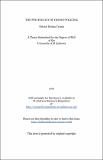Files in this item
The psychology of crowd policing
Item metadata
| dc.contributor.advisor | Reicher, Stephen | |
| dc.contributor.advisor | Johnson, Derek | |
| dc.contributor.author | Cronin, Patrick Declan | |
| dc.date.accessioned | 2019-05-07T17:35:02Z | |
| dc.date.available | 2019-05-07T17:35:02Z | |
| dc.date.issued | 2001-06-22 | |
| dc.identifier.uri | https://hdl.handle.net/10023/17658 | |
| dc.description.abstract | Traditional psychological explanations of crowd theory have decontextualised events and obscured the fact that crowd incidents are typically inter group encounters. This has led to research being rooted in the crowd whilst ignoring the other parties who may be present - including the police - and how events develop as function of the interaction between the two. The studies reported in this thesis attempted to provide insights into the decision making of senior public order officers of the Metropolitan Police utilising a variety of qualitative and quantitative methodologies. Four main studies are reported. In the first study (of police training) a grounded theory analysis revealed that the police have a fear of the crowd which is seen in a concern with provoking violence by being too harsh or permitting violence by being too lenient. The balance of harshness and leniency is informed by accountability considerations arising from internal and external sources and the phase of violence the officers perceived themselves to be in. In the second study, the relationship of accountability and phase was manipulated in a controlled experimental setting providing supportive evidence for the grounded theory model. The third was a series of pilot participant observation studies which looked at the policing of the Muslim festivals of Eid al Fitr and the Sikh festivals of Vaisakhi. These studies raised practical issues and was used in designing the fourth study which looked at the 'in vivo' processes of decision making during the biggest public order event in London of 1999. This confirmed and extended the focus on the importance of accountability concerns in senior officer decision making; firstly by showing them to be more complex than was originally thought, secondly by showing how those in different positions within the police had different accountability concerns, and thirdly by showing that such different concerns could lead to conflict between different sections of the police. The implications of this research and the foundations of future research are also discussed. | en_US |
| dc.language.iso | en | en_US |
| dc.publisher | University of St Andrews | |
| dc.subject.lcc | HV7993.C8 | |
| dc.subject.lcsh | Crowd control | en |
| dc.subject.lcsh | Problem-oriented policing | en |
| dc.title | The psychology of crowd policing | en_US |
| dc.type | Thesis | en_US |
| dc.type.qualificationlevel | Doctoral | en_US |
| dc.type.qualificationname | PhD Doctor of Philosophy | en_US |
| dc.publisher.institution | The University of St Andrews | en_US |
This item appears in the following Collection(s)
Items in the St Andrews Research Repository are protected by copyright, with all rights reserved, unless otherwise indicated.

